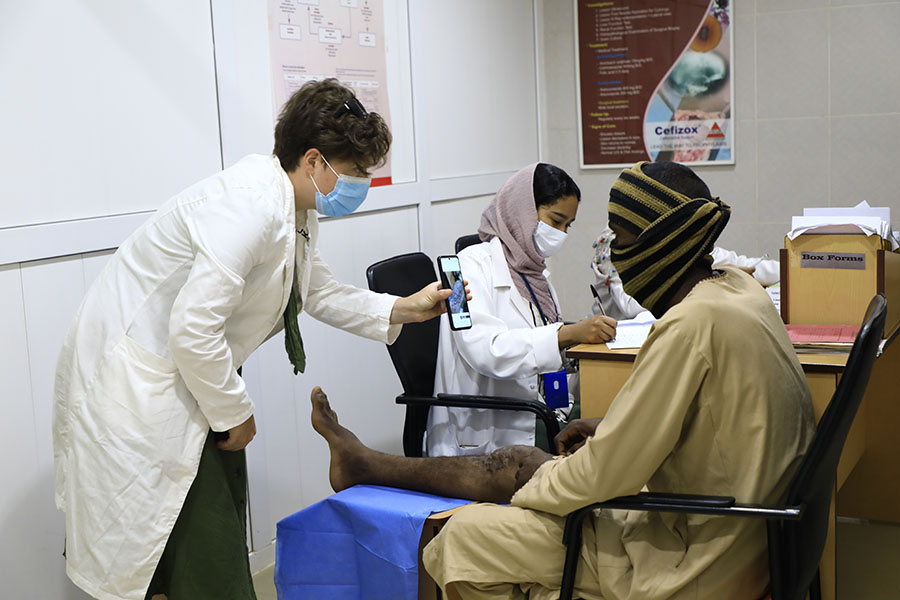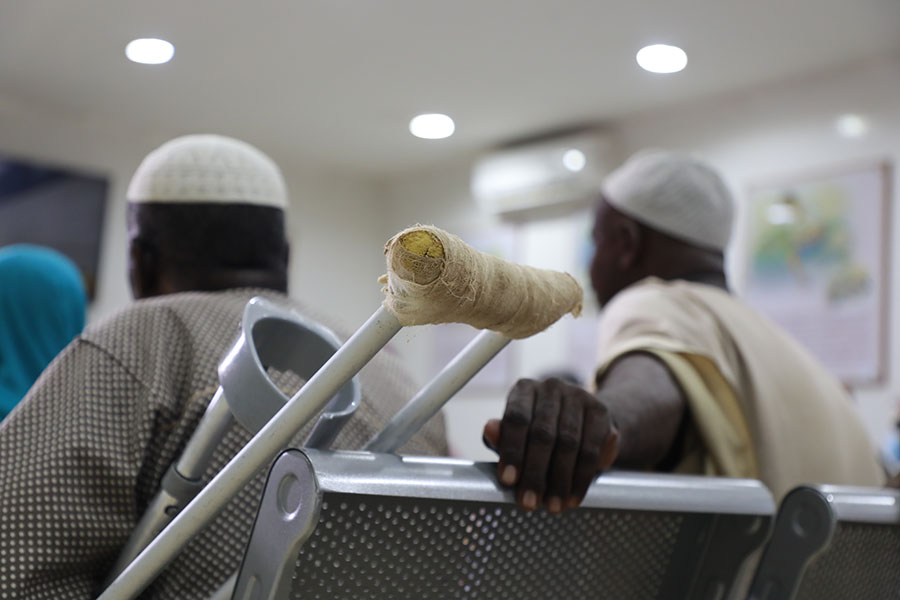The Mycetoma Research Center
The Mycetoma Research Centre (MRC), established in 1991 under the auspices of the University of Khartoum, has gained global recognition as a preeminent authority dedicated to mycetoma management, research and community engagement.
MRC is the only WHO Collaborating Center on mycetoma and skin-neglected tropical diseases. It stands out for its emphasis on a comprehensive and multi-disciplinary approach to mycetoma management. The center integrates medical, surgical, and rehabilitative interventions to provide a holistic and effective treatment strategy. This approach recognises the complex nature of mycetoma and aims to address its diverse aspects to enhance patient outcomes.
Given the geographical distribution of mycetoma and the often remote areas where affected individuals reside, MRC places significant importance on community engagement. The center recognises the need for support and improved treatment-seeking behaviour in these regions, emphasising the importance of involving local communities in managing and preventing mycetoma.
MRC’s commitment to patient-centric care is evident in its focus on principles such as equity, accessibility, and quality. By prioritising the needs and experiences of mycetoma patients, the center aims to deliver effective and humane treatment and management. The emphasis on equity ensures that mycetoma-affected individuals, often from marginalised backgrounds, receive the support and care they deserve.
Networking plays a crucial role in MRC’s approach to mycetoma control. Recognising that addressing mycetoma requires a collaborative effort, the center actively engages with national and international bodies, fostering cooperation and coordination. This networking approach is essential in pooling clinical expertise, financial resources, and social mobilisation efforts, facilitating real progress in controlling mycetoma.
Accessibility is a key consideration in MRC’s strategy, as the center strives to make services proximate to patient residences. Furthermore, providing free management services and sustainable access to medicines without charges aims to improve patient detection and reduce dropouts during the management process.
Quality remains a cornerstone of MRC’s approach, emphasising standardised management, close patient follow-up, and community engagement activities. Regular monitoring and evaluation activities are valuable tools for maintaining and improving the quality of services the Centre provides.
MRC strongly emphasises evidence-informed practice, acknowledging that research, innovation, and knowledge transfer are essential components of effective mycetoma control. By continually studying the disease and applying discoveries to patient management and care, the Centre ensures its efforts are grounded in the latest scientific understanding, contributing to ongoing advancements in the field.
MRC Justifications

Mycetoma, a globally neglected disease, exacts a heavy toll on the most vulnerable populations residing in impoverished, remote, and underprivileged communities. Its prevalence in these regions underscores the stark reality that mycetoma primarily afflicts the poorest of the poor. The consequences of this insidious ailment extend far beyond the confines of individual health, inflicting serious and devastating medical and socio-economic impacts on patients, their families, entire communities, and the already strained health systems within endemic regions. The burden of mycetoma is not merely confined to physical suffering; it permeates every facet of life in these marginalised areas. Patients grappling with mycetoma not only endure the pain and debilitation wrought by the disease but also face social stigma, diminished economic opportunities, and a heightened susceptibility to further health disparities. The long-lasting effects ripple through families, impairing their ability to thrive, perpetuating a cycle of poverty, and exacerbating the existing challenges faced by communities already grappling with limited resources. The repercussions extend to the broader health infrastructure, placing additional strain on already overburdened systems in regions where mycetoma is endemic. In essence, mycetoma’s profound impact underscores the urgent need for increased attention, resources, and concerted efforts to address the unique challenges posed by this neglected disease and alleviate the suffering of those who bear its brunt in the world’s most underserved communities. With limited treatment options available, there is a pressing need for novel therapeutic interventions. However, pharmaceutical companies have shown reluctance to invest in discovering mycetoma drugs.
MRC Vision
The Mycetoma Research Center vision is to continue as a world-leading centre to lead the change in the Mycetoma patients quality of life.
MRC Values

Multi-Disciplinary Team Building
The comprehensive management of mycetoma involves medical, surgical, and rehabilitative interventions. Therefore, a multi-disciplinary approach is imperative for effective patient care and optimal management outcomes.
Community Leadership
Mycetoma patients often reside in remote rural areas, characterised by low literacy rates and poor hygiene. Community involvement is crucial to enhance patient support, encourage timely treatment-seeking behaviour, and improve overall living conditions.
Patient-Centred Care
Mycetoma services are tailored to alleviate patients’ suffering, reduce the financial and social costs associated with the disease, and encourage proactive treatment-seeking behaviour. This approach extends to daily interactions between staff and patients, their families, and communities.
Equity
The availability and improvement of mycetoma management are regarded as a matter of human rights. Communities affected by mycetoma deserve equitable support and effective treatment comparable to patients grappling with other diseases.
Networking
Successful mycetoma control necessitates clinical expertise, financial resources, and social mobilisation. Collaboration and coordination with entities possessing such capacities, both nationally and internationally, are essential for meaningful progress in disease control.
Access
Ensuring the proximity of services to patient residences and providing free management services with sustainable access to medicines are fundamental to enhancing patient detection rates and reducing dropouts during the management process.
Quality
Providing standardised management, coupled with close patient follow-up and community engagement activities, is critical for achieving better treatment results and minimising disease complications. Regular monitoring and evaluation activities serve as valuable tools for service maintenance and improvement.
Evidence-Informed Practice
Research, innovation, and knowledge transfer are foundational to MRC’s mycetoma control practices. Activities are closely linked to ongoing disease studies, allowing the application of discoveries in patient management and care.
Read more about:

